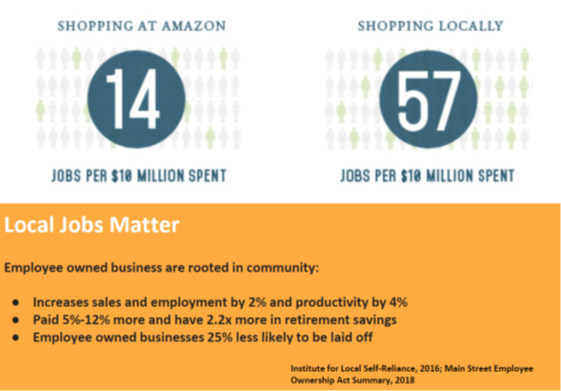Preparing Business Advisors to Carry Out New Mandate
by Karen Kahn

The Main Street Employee Ownership Act, passed in August 2018, relies heavily on the nation’s network of Small Business Development Centers (SBDCs) to educate and support business owners in transitioning their companies to employee ownership. But for the most part, SBDC business advisors aren’t familiar with employee ownership. To begin to fill that gap, The Democracy Collaborative has for the past year run an SBDC-Employee Ownership working group. The working group includes universities that are members of the Anchor Learning Network, a joint initiative with the Coalition of Urban and Metropolitan Universities. The working group has worked to build the capacity of university-based SBDCs to incorporate shared-equity business models into their business advising practice.
The SBDC-Employee Ownership working group has worked to build the capacity of university-based SBDCs to incorporate shared-equity business models into their business advising practice.
As their first project, the group developed a pilot training, which was delivered in California, Washington State, and New York, throughout April and early May. In each instance, ESOP and worker cooperative experts led the training, a 30-minute PowerPoint presentation covering:
· What employee ownership is, including ESOPs and coops
· Benefits of employee ownership
· The size of the employee ownership sector
· The role of business advisors in educating and supporting employee ownership
Of the 900 SBDCs nationwide, half are on college and university campuses, giving the working group the opportunity to spread the knowledge gained in the pilot trainings throughout the SBDC network.
Three SBDCs in California — from the University of San Diego, MiraCosta College, and Shasta College — participated in the first training, April 2, presented by Project Equity and the California Center for Employee Ownership, which recently opened at the University of San Diego Rady School of Management.
Of the 900 SBDCs nationwide, half are on college and university campuses, giving the working group the opportunity to spread the knowledge gained in the pilot trainings throughout the SBDC network.
In New York State, the Onondaga SBDC, along with Cooperation Buffalo, CoLab Cooperative, and Fust Charles Chambers, presented the training to all the SBDC state offices during a monthly conference call in late April, and again at a statewide SBDC gathering early in May.
Finally, the Northwest Cooperative Development Center, along with the California Center for Employee Ownership, in late April, presented a two-hour workshop based on the pilot at the Washington State SBDC conference. Diane Gasaway, executive director of the Northwest Cooperative Development Center, says that around 50 people attended and engaged is a good dialogue about both ESOPs and cooperatives.

“Higher education is uniquely positioned to support employee ownership,” said Emily Sladek, who as manager of higher education engagement for The Democracy Collaborative led this working group. “The public mission of higher education calls on it to foster lifelong democratically engaged citizenry, develop a prepared workforce, and discover new knowledge that will address persistent social problems.”
Because college- and university-based SBDCs are funded partially by the institutions that house them (roughly 50 percent of their funding comes from the federal government), these institutions have the ability to shape their SBDC programs. For those that embrace the anchor mission — seeking to use their considerable resources to build prosperity in their local communities — promoting employee ownership through the SBDC could be a particularly effective wealth-building strategy. Employee ownership creates and preserves local jobs, strengthens local businesses, and helps to raise income for workers through better wages and long-term wealth accumulation.
Karen Kahn provides communications consulting and editorial support for Fifty by Fifty.
Fifty by Fifty, an initiative of @Democracy Collab, is working to transform the U.S. economy by growing employee ownership. Join our campaign, and we’ll send our monthly newsletter, filled with great company stories, right to your inbox.
